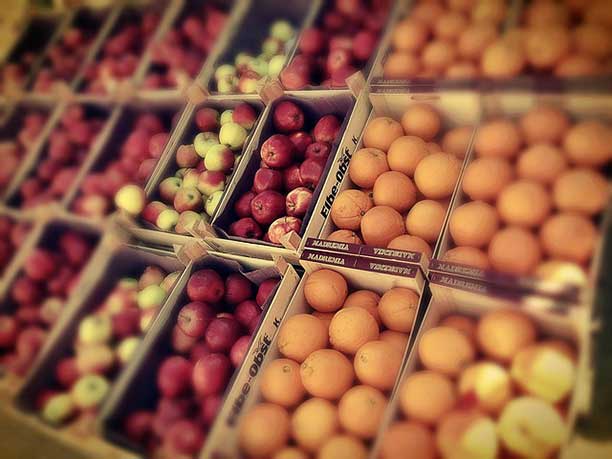This is the third post in the Mindful Eating series. To view other posts, please visit:
(1) Learning to Eat Mindfully
(2) Thinking about Food
(3) Choosing the Foods We Eat
(4) Cooking with Awareness
(5) Serving Food Thoughtfully
(6) Preparing to Eat
(7) Experiencing the Meal
(8) Cleaning with Intention
(9) Conclusion
One of the most fundamental things we do every day for ourselves, for each other and for our Earth is to choose what foods we will put into our bodies.
But, this decision is becoming more and more difficult with so many new ways to process our foods and so many new food products appearing daily. This choice, though, is one that we all must contemplate with openness and honesty if we are to change our relationship with the food in our bowls.
Mindful eating allows us to see deeply into the foods we eat and to understand in a very profound way the three essential considerations when choosing what foods should nourish our bodies and minds – morality, healthfulness and frugality.
Morality
 There are over 7 billion people living on our Earth. Close to 1 billion suffer from hunger and malnutrition. Distressingly, hunger plays a role in the deaths of 5 million children each year.
There are over 7 billion people living on our Earth. Close to 1 billion suffer from hunger and malnutrition. Distressingly, hunger plays a role in the deaths of 5 million children each year.
Those numbers are staggering. So staggering, they seem almost insurmountable. What can be done – on a cultural level and on an individual level – to reduce the amount of suffering, to make sure everyone has enough nutritious food to eat?
It is simple. Stop consuming meat and other animal products.
The world’s cows, alone, consume more than enough calories to feed the human population of the Earth.
In addition, approximately 80 percent of all land in the United States is used to raise animals for food or to grow food to feed those animals, and nearly half of all water used in the US goes toward this purpose.
Raising animals for consumption also impacts our Earth. Animal agriculture is responsible for more greenhouse gasses than all the cars, trucks, planes and ships in the world. In fact, more than a third of all fossil fuels consumed in the United States are used in animal agriculture. Additionally, farmed animals produce over 130 times more excrement than all of the human population combined. This excrement pollutes the Earth’s air, waterways and soil.
These natural resources, our land and water, our fossil fuels, are precious and limited. We should not squander them. We should not continue to use them up if there are other options. This is not sustainable.
 I have not yet mentioned the suffering inflicted upon animals, themselves. In Western society, we have been led to believe that animals used for food live their lives on open pastureland and are then humanely slaughtered. This sort of life is not the case for the vast majority of animals raised for consumption, and the slaughtering of an animal is always a very violent act. There are many places on the Internet to learn about the ways animals are raised and killed, and if you are unsure, you should spend time finding out. You should not continue to eat meat without knowing how it came to be on your plate. That is not mindful.
I have not yet mentioned the suffering inflicted upon animals, themselves. In Western society, we have been led to believe that animals used for food live their lives on open pastureland and are then humanely slaughtered. This sort of life is not the case for the vast majority of animals raised for consumption, and the slaughtering of an animal is always a very violent act. There are many places on the Internet to learn about the ways animals are raised and killed, and if you are unsure, you should spend time finding out. You should not continue to eat meat without knowing how it came to be on your plate. That is not mindful.
It may be tempting to turn a blind eye and simply not consider the suffering of other beings. Understanding that, in the past, our consumption has caused suffering can feel overwhelming to us. It is much easier simply not to consider it. Our culture – and those companies that profit from animals’ suffering – have made this a very easy thing to do. It is something that is not often shown on television or printed in the newspaper. It is not easily seen. You must decide for yourself that this knowledge is important enough to seek out. You must soften your heart.
Eating should not be a violent act. Eating should nurture you and your loved ones, as well as the Earth and all other living beings. Begin to choose your food with awareness and compassion for all living creatures on this beautiful planet.
Healthfulness
 The foods we choose to eat become a part of us in the most literal sense. We are made up of juicy nectarines and crisp apples, plump eggplants and bright bell peppers. We are made of all the foods we consume. If we eat processed foods, we are choosing to make those foods and chemicals a part of ourselves. If we eat produce that has been sprayed with pesticides, we are choosing to incorporate those chemicals into our bodies and minds. If we decide to eat foods that have been genetically modified by other humans (as opposed to traditional crossbreeding and hybridization) , we are choosing to make those new foods a part of us.
The foods we choose to eat become a part of us in the most literal sense. We are made up of juicy nectarines and crisp apples, plump eggplants and bright bell peppers. We are made of all the foods we consume. If we eat processed foods, we are choosing to make those foods and chemicals a part of ourselves. If we eat produce that has been sprayed with pesticides, we are choosing to incorporate those chemicals into our bodies and minds. If we decide to eat foods that have been genetically modified by other humans (as opposed to traditional crossbreeding and hybridization) , we are choosing to make those new foods a part of us.
Of course, if we choose to eat foods that are grown without modification, without pesticides, foods that are nourished by the sun and the rain and the soil, foods that are pulled from the Earth plump and perfect and simple, we are allowing them to become a part of us, too, to nourish our bodies and our minds, to connect us to the Earth and all living beings.
Humans change food in many ways, and we have been doing it more and more. Many of these ways turn nourishing foods into things that are toxic to our bodies and minds, but most of us do not know this. We see a commercial for a food on television or we pass by it in a supermarket, and it looks scrumptious. We decide to eat that food based solely on how it is presented to us. We do not consider how it might harm us or help us.
But this is a wrong way to choose foods. We must look deeply at an apple, we must see not only the sun, the rain, the dark soil, but the chemicals that were sprayed on it, the wax used to make the apple look shiny. We must not close our eyes. We must see the food as it is.
Frugality
 Our enjoyment of the food does not need to depend upon how much we paid for the meal. On the contrary, many of the most sublime meals are often the simplest. The cook uses just a few ingredients cooked lightly to enhance their natural flavors.
Our enjoyment of the food does not need to depend upon how much we paid for the meal. On the contrary, many of the most sublime meals are often the simplest. The cook uses just a few ingredients cooked lightly to enhance their natural flavors.
Unfortunately, many people equate eating well with eating expensively.
The cost of a food, for many of us, is of prime consideration. We must consider whether we can afford to eat this food before considering anything else. And, most processed foods in the West are much more inexpensive than whole foods. This is because of the heavy subsidization of certain crops such as corn and soybeans.
But, these sorts of foods do not nourish our bodies or our minds with the nutrients we need to thrive as humans, and the money we pay for them goes back to the corporations that produced them, allowing them to create more of these foods for others. Many people are malnourished even though they eat enough, or more than enough, calories to sustain themselves. They do not understand why they are sick or tired. They do not connect the way they feel inside their bodies to the foods that they consume.
 Most staple foods are actually very frugal. Grains, beans and lentils, root vegetables, and seasonal produce can cost as little as, or less than, processed foods. In addition, you are providing your body with the nutrients you need in order to feel healthy and energetic. Eating nourishing food allows you to save money on doctor and hospital visits and medicine. And, it may save your life, the lives of your loved ones and the lives of many other living beings.
Most staple foods are actually very frugal. Grains, beans and lentils, root vegetables, and seasonal produce can cost as little as, or less than, processed foods. In addition, you are providing your body with the nutrients you need in order to feel healthy and energetic. Eating nourishing food allows you to save money on doctor and hospital visits and medicine. And, it may save your life, the lives of your loved ones and the lives of many other living beings.
Choosing mindfully what foods to consume is our responsibility to ourselves, to others and to the planet. When you look deeply into your food, you understand how eating can change us and change the world.
How do you mindfully choose which foods to prepare for yourself and your loved ones?

Thank you for your directness, honesty, and clarity on this very important and life-changing subject. I feel I myself, time and time again, fall into easily being unaware of the connection between the food I put into my body, and how it impacts me and our precious world. What you’ve expressed is a powerful, heart-felt, and compassionate reminder. Again, thank you.